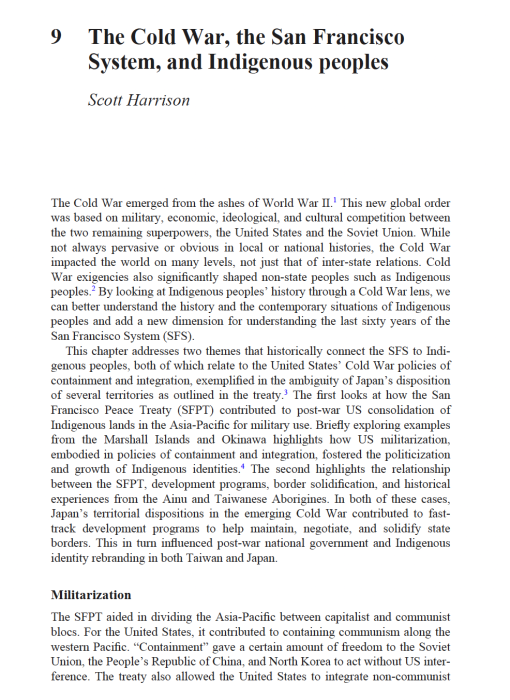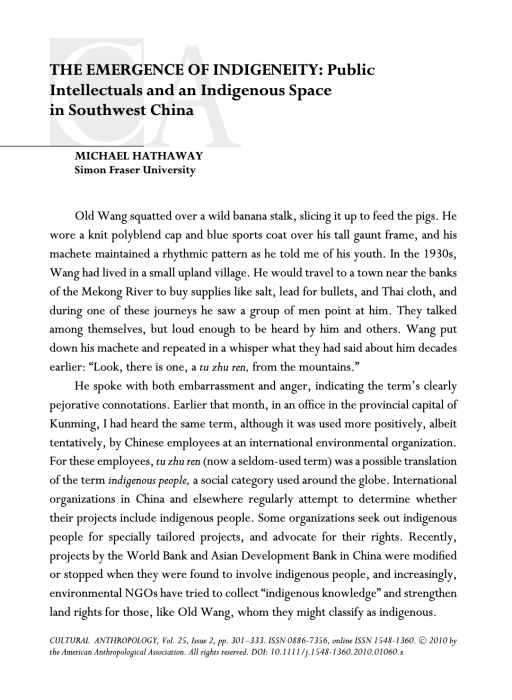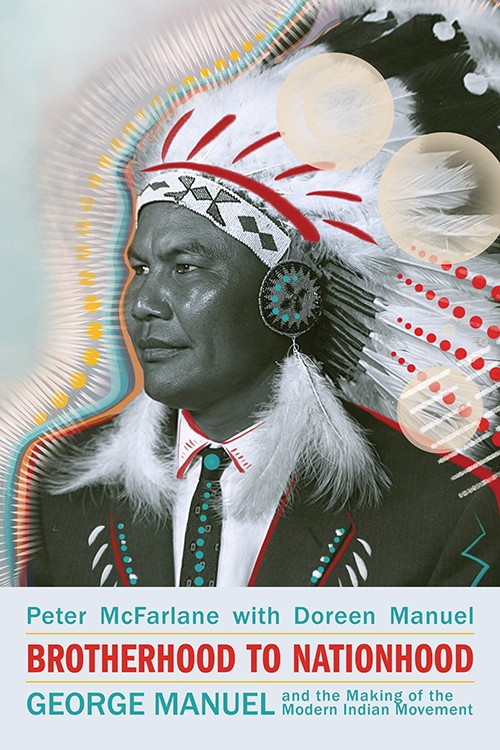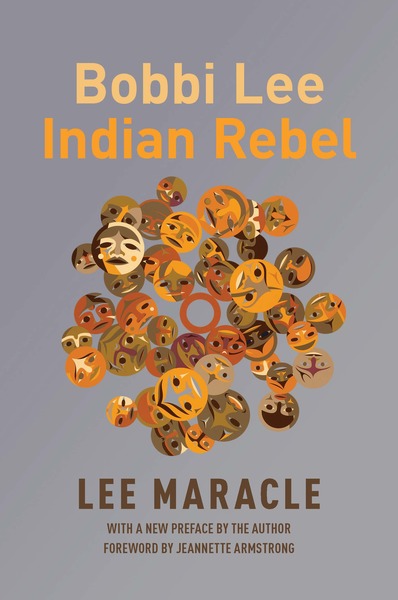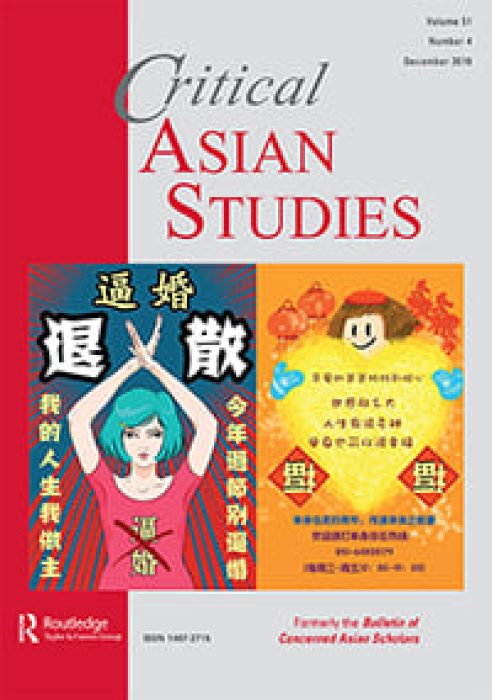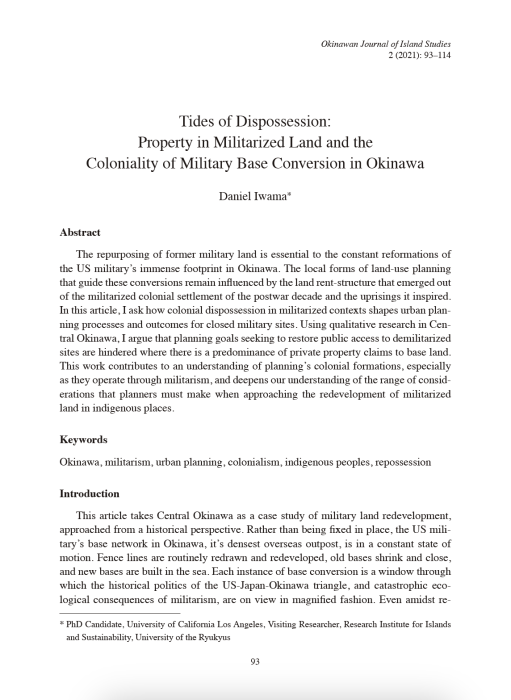The Concept of Indigenous Peoples in Asia: A Resource Book
Christian Erni (2008)
This collection of essays serves as a guide in exploring Indigeneity and minority groups in Asia. Drawing from a rich tapestry of history, anthropology, legal studies, and Indigenous studies, these essays provide valuable insights for anyone seeking a deeper understanding on Indigenous Asia。
The Cold War, the San Francisco System, and Indigenous peoples.
Scott Harrison (2015)
In K. Hara (Ed.), The San Francisco System and Its Legacies (pp. 203–219)
This book examines the themes that played a pivotal role in shaping Indigenous identities in Japan and Taiwan, thus shedding light on the intricate dynamics of Indigenous history during the transformative era of the Cold War.
The emergence of Indigeneity: Public intellectuals and an Indigenous space in Southwest China
Michael Hathaway (2010)
This discussion delves into the realm of Indigenous identities in China through the lens of environmentalism. Hathaway offers a deep exploration into how environmental concerns in China reshape the way we perceive identity and belonging.
The colonial annexation of Okinawa and the logic of international law: the formation of an ‘indigenous people’ in East Asia
Hideaki Uemura (2003)
This analysis delves into the annexation of Okinawa and the formation of the Japanese nation-state, placing a spotlight on the Indigenous Ainu and how their Indigenous identity has developed over time.
The Ainu Group at the Louisiana Purchase Exposition, 1904
James W. Vanstone (1993)
A historical account of the nine Ainu individuals who were brought from Hokkaido to participate in the ‘Living Group Exhibit’ at the 1904 Louisiana Purchase Exposition.
This historical chronicle recounts the fascinating journey of nine Ainu individuals who were brought from Hokkaido to be part of the ‘Living Group Exhibit’ at the Louisiana Purchase Exposition. In unveiling their unique experiences, this article sheds light on a lesser-known chapter of Indigenous Ainu history.
Once were Maoists: Third World currents in Fourth World anti-colonialism, Vancouver, 1967–1975
Glen Sean Coulthard (2020)
In this chapter, Coulthard dives into the history of Red Power by exploring the political endeavours of a group called the Native Alliance for Red Power (NARP), which was formed by Indigenous activists in Vancouver from 1967 to 1975.
Brotherhood to Nationhood: George Manuel and the Making of the Modern Indian Movement.
Doreen Manuel & Peter McFarlane (2020)
George Manuel (1920-1989) laid the foundation for what would become the Assembly of First Nations and served as inaugural president of the World Council of Indigenous Peoples. This book takes you on a journey spanning three decades of unwavering activism for Indigenous rights.
The Fourth World: An Indian Reality
George Manuel & Michael Posluns (2018)
With forward by Vine Deloria Jr., introduction by Glen Sean Coulthard, and afterword by Doreen Manuel.
In this book, Manuel and Posluns pioneer the concept of the ‘fourth world’ to describe the unique position of Indigenous nations within settler-colonial nation states. The book offers a compelling historical record, following Indigenous activism and organising across Canada.
Epilogue. In Bobbi Lee: Indian Rebel
Lee Maracle (1990)
In her raw autobiography, the late Lee Maracle (formerly Bobbi Lee) shares the story of her life as an Indigenous woman who came of age in Vancouver during the 1960s and 1970s. In the epilogue, she recounts her trip to China as part of the Native People’s Friendship Delegation.
Canada's Other Red Scare: Indigenous Protest and Colonial Encounters During the Global Sixties
Scott Rutherford (2020)
Rutherford delves into the world of Indigenous political protest in the early 1960s and early 1970s, which was inspired by Black struggles in the US and decolonization in the Southern Hemisphere.
As We Have Always Done: Indigenous Freedom Through Radical Resistance
Leanne Betasamosake Simpson (2017)
In this book, Simpson reveals the incredible place-based political resurgence of Indigenous nations, where Indigenous ideas are used to make powerful impacts in thinking, writing, and organizing.
Hokkaidō 150: Settler colonialism and Indigeneity in modern Japan and beyond
Tristan R. Grunow, Fuyubi Nakamura, Katsuya Hirano, Mai Ishihara, Ann-Elise Lewallen, Sheryl Lightfoot, & Tomoe Yahata (2019)
This roundtable discussion sheds light on the overlooked impact of Japanese colonization on the Indigenous Ainu. Participants challenge conventional narratives and explore the diversity of Indigenous experiences in modern Japan.
Indigenous London: Native travelers at the heart of empire.
Coll-Peter Thrush (2016)
Historian Coll Thrush uncovers London’s city history through the eyes of the Indigenous people who travelled there. This totally new narrative reveals how Indigenous peoples have played a key role in creating the London we know today.
The world and all the things upon it: Native Hawaiian geographies of exploration
David A. Chang (2016)
David A. Chang’s book explores how Kanaka Maoli (Native Hawaiian people) shape their place in the world. In exploring themes of travel, sexuality, spirituality, and more, Chang provides a unique perspective on imperialism and colonialism.
Additional Resources
Ken S. Coates (2004)
Ravi de Costa (2006)
Candace Fujikane & Jonathan Y. Okamura (2008)
Sheryl Lightfoot (2016)
Maximilian C. Forte (2010)
Jane Carey (2014) edited by Jane Lydon
Benedict Kingsbury (1995)
Frances Abele & Thierry Rodon (2007)
Mark K. Watson (2014)
Linda Johnson (2015)
Daniel M. Cobb (2008)
Nick Estes (2019)
Gyorgy Ferenc Toth (2012)
Jodi A. Byrd (2011)
Douglas Sanders (1989)
El descubrimiento de Europa: Indígenas y mestizos en el Viejo Mundo
Media Activism in the Red Power Movement
Miranda J. Brady (2020)
Mapping the Americas: The Transnational Politics of Contemporary Native Culture
Shair M. Huhndorf (2009)
Brian Warren (2020)


